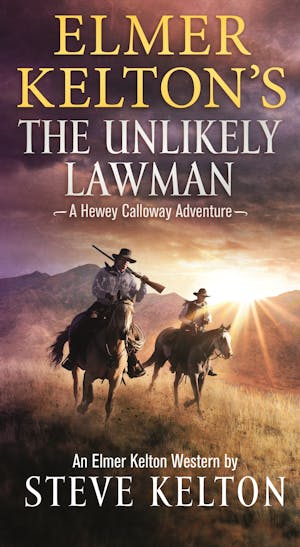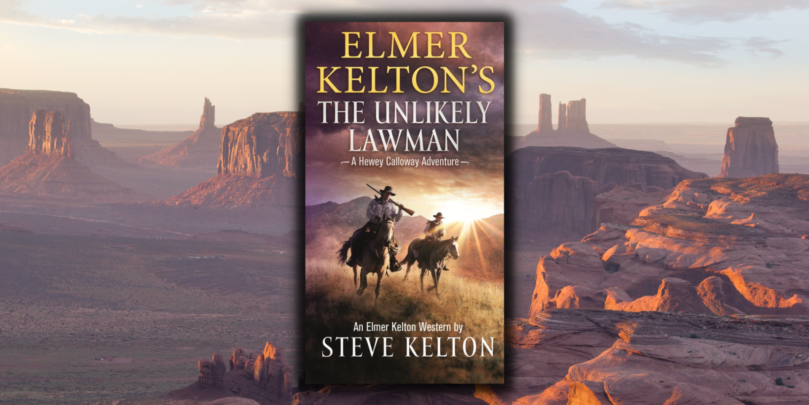 Elmer Kelton’s Hewey Calloway, one of the best-loved cowboys in all of Western fiction, returns in this novel of his middling years, as he looks for work—but not too much work—in 1904 West Texas.
Elmer Kelton’s Hewey Calloway, one of the best-loved cowboys in all of Western fiction, returns in this novel of his middling years, as he looks for work—but not too much work—in 1904 West Texas.
Hewey Calloway is heading north to Colorado, on a horse drive for an old friend, Alvin Lawdermilk, when he gets word that one of his hired hands is planning to rob him. After the plot is foiled, the fugitive horsehand is on the run and leaving bodies in his wake.
Deputized to help bring the criminal to justice, Hewey is bestowed with a weight of responsibility that he’s long avoided. Never known for his skill—or lack thereof—with a pistol, he can only pray that he and retired Texas Ranger Hanley Baker will be enough to put an end to this trail of dastardly deeds.
Steve Kelton’s The Unlikely Lawman will transport you to an Old West full of duplicity, gunfights, and the often-unforgiving hardships of frontier life.
The Mass Market edition of The Unlikely Lawman will be available on July 26th, 2022. Please enjoy the following excerpt!
CHAPTER ONE
Hewey Calloway was in his element.
It was spring, and West Texas had on her Sunday best. The morning sun was warm, the effects of earlier rains beginning to show. Green shoots had appeared in the few clumps where grass grew, and much of the rest of the ground boasted tallow weed and other plants Hewey knew but couldn’t name. Most of the cows he saw had babies by their sides, full udders, and a thin layer of fat beginning to show on their ribs and over their hip bones. The cows without calves were pig fat and would soon be cut off and sold as freeloaders that wouldn’t earn their keep this year.
Hewey was on horseback, taking it all in with the pride of ownership, but without the headaches or expectation of reward. These were Two Cs cattle and belonged not to Hewey but to ranchman C. C. Tarpley, who had just fired Hewey at the chuckwagon that morning.
It wasn’t the first time Tarpley had fired Hewey, and it probably wouldn’t be the last. Hewey had even quit once or twice himself, but the two always came to an accommodation eventually; Hewey was a good cowboy, and C.C. valued that, even if he didn’t value it enough to pay well. Parsimony was a common condition among the ranch owners Hewey had known, though C. C. Tarpley displayed a more severe case than most.
Hewey had a month’s worth of C.C.’s stingy pay in his pocket, a brown horse that would watch a cow, and he was gloriously unemployed.
So close to his fortieth birthday that he could hear it taunting him in quiet moments, Hewey was the older of two sons. Their widowed father had a restless streak that he stamped indelibly on his first-born. The three Calloways—Pa, Hewey, and brother Walter—had drifted constantly within the East Texas region of blackland farms, picking up what work was available to them. As a boy, Hewey drug a cotton sack for miles before he was big enough to put behind a mule and a pair of plow handles. They were an ill fit for his hands from the beginning, and Hewey chafed to be somewhere else, doing something else. Brother Walter, a year younger, took to farm work like he was born for it. It was only at Hewey’s insistence after Pa died that the two brothers went west looking for cowboy jobs that were said to be plentiful in the Pecos River country, and the brothers found the job situation to be as advertised.
A decade and a half later, in 1904, Hewey had earned a reputation in West Texas and eastern New Mexico as a top hand, and Walter was back behind a plow, but this time it was his own, and he was turning back native sod on his own land. Walter was the only one of the Calloway clan, what little Hewey knew of it, to own land. Back in East Texas, where it rained, Walter’s homestead would sound like an empire up against the farms that were common. In a moment of clarity, someone in the Texas legislature had realized years earlier that it didn’t rain much west of San Angelo, and not a lot even there. The state had a world of West Texas land it couldn’t use and was leasing it to cattlemen at a pittance for grazing. From then on, Texas law allowed homesteaders to claim up to four sections—four square miles—a full sixteen times as much as the average 160-acre farm back east.
It appeared generous to people in rainier regions, but it wouldn’t run enough cows to sustain a single man, much less a man with a family. Walter was one of many West Texans who had a four-section outfit and a family, and most years the money ran out before the year did. His bride refused to give up, however, and at her insistence Walter began breaking out land to farm, first a few acres, then a few more. The delta cotton of the Blacklands could never be grown here, so Walter planted feed crops instead. Hewey had counseled against the entire endeavor, reasoning that land that resented the cow would look even less kindly at the plow. That only got him cold stares from his sister-in-law.
Alvin Lawdermilk had his hands full supervising a small crew of cowboys sacking out young horses in the breaking pen, but he didn’t miss the approaching rider.
“Howdy, Hewey,” he said with a slight wave of his hand as Hewey dismounted, a friendly acknowledgment but not a broad enough movement to spook the excitable horses. He extended the hand to Hewey through the fence, then quietly eased out the gate and led the way to a spot on the shady side of the saddle barn.
Alvin was middle-aged and graying, a thin man with a slight stoop, but he was still strong enough to fight a recalcitrant horse or mule, his primary products. He left most of the bronc riding to younger hands, having hit the hard, dry ground more often than he cared to already. Besides, he no longer bounced like he had when he was younger.
“What are you doin’ out footloose in the middle of a workday?” he asked Hewey. “Did ol’ C.C. have a stroke and give you hands a vacation?”
“Just one of us. He gave me a permanent day off.” Hewey gave a broad, slightly crooked grin.
“You two can’t get along with or without each other. What’d you pull this time?”
“Wasn’t much, but C.C. is pretty excitable and damned unreasonable sometimes. I was toppin’ off one of the broncs in my string this mornin’, just gettin’ his kinks worked out so he’d settle down for the day’s drive. The next thing I knew, we was right in the middle of camp, scatterin’ cowboys left and right. I was doin’ good to keep a leg on either side of him, and reinin’ that renegade was out of the question, so you can see it wasn’t my fault.
“Even at that the whole thing would’ve made for a good laugh if ol’ C.C. hadn’t been right square in that bronc’s sights. I gotta admit, for a short, stoveup old man, C.C. can still move pretty good when he’s about to git ground into the dirt. By the time the dust cleared he was cussin’ me and I was cussin’ his miserly taste in horseflesh. He blowed up and said his horses was just fine, but if I didn’t like ’em I could draw my time and go ride somebody else’s horses.
“So here I am, ridin’ my own.”
“If you’d got yourself fired a week earlier, I’d have let a couple of these knuckleheads ride on past. They don’t have any trouble bellyin’ up to the table, and they can find their bedrolls just fine, but you’ve gotta lead ’em by the hand to everything else.”
“Thanks all the same, Alvin,” Hewey said, “but I ain’t looking for work just yet. I’ve got a month’s pay to carry me a while, and I ain’t been fired long enough to enjoy it.”
“Does Eve know?” Alvin’s tone took on a note of gravity as he asked.
“I haven’t been by Walter and Eve’s place yet. Your outfit is closer to where the wagon was when me and C.C. had our disagreement.”
“Well, then you’ll stay the night. You missed dinner, but supper will be ready in a few hours.”
“I’d sure like to, Alvin, but I reckon I oughta water out and get on over to Walter’s and see which way the wind’s blowin’.”
“I can tell you right now it’ll be blowin’ straight into your face.”
“Oh, Eve ain’t always on a tear, Alvin. I’ve caught my sister-in-law in a good mood two, maybe three times.”
“And how long did that last?”
“Not very long with me around,” Hewey acknowledged, wincing at the memory. He thought that Alvin’s mother-in-law was just as disapproving. Alvin didn’t need to be reminded of that, however, so Hewey didn’t.
“I’ll sure miss havin’ the company of your womenfolk at a civilized table, Alvin, but if you’ll give ’em my regards, I’d best get on.”
“You’re a damned poor liar, Hewey Calloway,” Alvin said with a chuckle. “You won’t miss Mother Faversham any more than I would if she wandered off in the dark one night and never come home. But two doses of that medicine in the same day are too many for any man, and I have a hunch you’ll get a big dose from Eve.”
Old Lady Faversham, as she was known behind her back to the Lawdermilk crew and most any cowboy who’d ever joined it for a spell, was a grumpy, bitter old woman for reasons Hewey couldn’t fathom. Someone had done her wrong at some point in her life, or at least she thought so, but it was long before Hewey met her. He just knew that she focused most of her ire against any man who came within range. She was strong in her opinions and not at all modest about sharing them.
They shook hands again, and Hewey remounted for the short ride to the water trough. Like most cowboys, it would never dawn on him to walk and lead his mount; horses were for riding.
“I’m gettin’ old, Hewey; I almost forgot. I’ll have a job for you in a couple or three weeks, assuming my good hands and those two knuckleheads have these fillies shaped up by then. A fellow near Durango, Colorado, has contracted for the lot, more than seventy head. If you’re available, I’d like you to take ’em.”
“Don’t they raise horses in Colorado?”
“They raise a lot, but not like mine,” Alvin answered with pride. “There’s something about the Pecos River.”
Hewey knew the difference was in the horse savvy, and Alvin had that.
“Sorry about you gettin’ fired, Hewey, but it was a stroke of luck for me. You’re just the man for this little job. I’ve never seen anybody take to the cowboy life like you.”
“Appreciate the offer, Alvin. I’ve never seen that country. I’ll think on it.”
Hewey was glad he’d made the slight detour to the Lawdermilk place. If he’d hit Walter’s an hour earlier, he would have come face-to-face with Eve Calloway, alone. As it was, Walter had just finished watering the wagon team and was between the rough barn and the equally spare house when Hewey rode up.
The Calloway homestead wasn’t much to look at. Even Hewey was of that opinion, and he’d helped Walter build it all. The house was what was referred to as box-and-strip construction. Set up on stacks of flat rocks, the structure was built of wide, rough-cut boards nailed vertically, the gaps between them covered by narrower strips. The roof was rude wood shingles that shrank in the dry air until sunlight filtered through in the daytime, and a full moon provided enough interior lighting to see by. The shingles quickly swelled when challenged by the occasional rainstorm, however, and the interior remained mostly dry.
Wind whistled through the walls at first, but Eve gradually stopped that with old newspapers and flour paste, light on the precious flour. With opportunities for schooling scarce, Eve made double duty of the newspapered walls by teaching both boys to read, mostly with headlines that celebrated the advances of the closing century and speculated wildly about miracles to come in the new one. Nothing stopped the wind that came up through the plank floor except rugs, and those were limited, as were other amenities.
The Calloways’ barn was of similar construction, minus the wallpaper and rugs. Neither house nor barn had seen any paint, inside or out, for paint cost money. The corrals were not a square foot larger than necessary, and a windmill and cypress storage tank with a rock and concrete water trough completed the layout. Eve’s chickens roosted under the lean-to shed attached to the barn, and she made a daily round of brush clumps to collect the hidden eggs before a raccoon, skunk, or ringtail found them first.
The Calloways lived little if any better than sharecroppers back east, with but one exception: they had lived there long enough to satisfy the Homestead law, and they had a deed from the State of Texas to prove that the land was theirs. To Walter and Eve that meant the world.
To Hewey it looked more like a life sentence of hard labor.
“Well, if it ain’t the Prodigal Brother!” Walter exclaimed when he saw Hewey. “What in the world brings you by here on Two Cs business?”
“I ain’t with the Tarpley outfit anymore; I’m here on my own business,” Hewey answered with a broad grin.
Walter’s own smile faded just a bit when he heard that, and Hewey noticed.
“Reckon I’ll see to Biscuit, while you break the news to Eve.”
“Break what news to me?” Eve had seen the rider and walked up on them while neither was looking.
“Now, Eve, I’ve got somethin’ lined up . . .” Hewey began.
“Speak English, Hewey Calloway.”
“I been fired, Eve.”
Eve laughed, and the two men cut a glance at each other. “I was afraid you’d fooled around and married some floozie. You’ve been fired before. The two of you wash up and come to the house. I baked a pie earlier, and there should be just enough to go around. We’ll celebrate your visit.”
With that, Eve turned toward the house, leaving two dumbfounded men staring in her wake.
“Walter,” Hewey said solemnly, “some fool’s gone and kidnapped your wife.”
Click below to pre-order your copy of The Unlikely Lawman, coming July 26th, 2022!













Comments are closed.
Leave a Reply